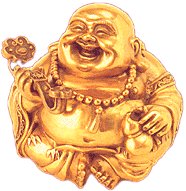|
|



|
|
HOME
Meditation What is Meditation? Power of Now Concentration & Insight Law of Attraction J Krishnamurti Tao Te Ching Dhammapada Buddhist Classics
|
Random Image
Meditation
Moving Deeply into the Now
...continued from part one
Excerpts from The Power of Now written by Eckhart Tolle
(italicized portions are questions placed to Eckhart)
The Key to the Spiritual Dimension
In life-threatening emergency situations, the shift in consciousness from time to presence sometimes happens naturally. The personality that has a past and a future momentarily recedes and is replaced by an intense conscious presence, very still but very alert at the same time. Whatever response is needed then arises out of that state of consciousness.
The reason why some people love to engage in dangerous activities, such as mountain climbing, car racing, and so on, although they may not be aware of it, is that it forces them into the Now - that intensely alive state that is free of time, free of problems, free of thinking, free of the burden of the personality. Slipping away from the present moment even for a second may mean death. Unfortunately, they come to depend on a particular activity to be in that state. But you don't need to climb the north face of the Eiger. You can enter that state now.
~ ~ ~
Since ancient times, spiritual masters of all traditions have pointed to the Now as the key to the spiritual dimension. Despite this, it seems to have remained a secret. It is certainly not taught in churches and temples. If you go to a church, you may hear readings from the Gospels such as "Take no thought for the morrow; for the morrow shall take thought for the things of itself," or "Nobody who puts his hands to the plow and looks back is fit for the Kingdom of God." Or you might hear the passage about the beautiful flowers that are not anxious about tomorrow but live with ease in the timeless Now and are provided for abundantly by God. The depth and radical nature of these teachings are not recognized. No one seems to realize that they are meant to be lived and so bring about a profound inner transformation.
~ ~ ~
The whole essence of Zen consists in walking along the razor's edge of Now - to be so utterly, so completely present that no problem, no suffering, nothing that is not who you are in your essence, can survive in you. In the Now, in the absence of time, all your problems dissolve. Suffering needs time; it cannot survive in the Now.
The great Zen master Rinzai, in order to take his students' attention away from time, would often raise his finger and slowly ask: "What, at this moment, is lacking?" A powerful question that does not require an answer on the level of the mind. It is designed to take your attention deeply into the Now. A similar question in the Zen tradition is this: "If not now, when?"
~ ~ ~
The Now is also central to the teaching of Sufism, the mystical branch of Islam. Sufis have a saying: "The Sufi is the son of time present." And Rumi, the great poet and teacher of Sufism, declares: "Past and future veil God from our sight; burn up both of them with fire."
Meister Eckhart, the thirteenth-century spiritual teacher, summed it all up beautifully: "Time is what keeps the light from reaching us. There is no greater obstacle to God than time."
Accessing the Power of Now
A moment ago, when you talked about the eternal present and the unreality of past and future, I found myself looking at that tree outside the window. I had looked at it a few times before, but this time it was different. The external perception had not changed much, except that the colors seemed brighter and more vibrant. But there was now an added dimension to it. This is hard to explain. I don't know how, but I was aware of something invisible that I felt was the essence of that tree, its inner spirit, if you like. And somehow I was part of that. I realize now that I hadn't truly seen the tree before, just a flat and dead image of it. When I look at the tree now, some of that awareness is still present, but I can feel it slipping away. You see, the experience is already receding into the past. Can something like this ever be more than a fleeting glimpse?
You were free of time for a moment. You moved into the Now and therefore perceived the tree without the screen of mind. The awareness of Being became part of your perception. With the timeless dimension comes a different kind of knowing, one that does not "kill" the spirit that lives within every creature and every thing. A knowing that does not destroy the sacredness and mystery of life but contains a deep love and reverence for all that is. A knowing of which the mind knows nothing.
The mind cannot know the tree. It can only know facts or information about the tree. My mind cannot know you, only labels, judgments, facts, and opinions about you. Being alone knows directly.
There is a place for mind and mind knowledge. It is in the practical realm of day-to-day living. However, when it takes over all aspects of your life, including your relationships with other human beings and with nature, it becomes a monstrous parasite that, unchecked, may well end up killing all life on the planet and finally itself by killing its host.
You have had a glimpse of how the timeless can transform your perceptions. But an experience is not enough, no matter how beautiful or profound. What is needed and what we are concerned with is a permanent shift in consciousness.
So break the old pattern of present-moment denial and present-moment resistance. Make it your practice to withdraw attention from past and future whenever they are not needed. Step out of the time dimension as much as possible in everyday life. If you find it hard to enter the Now directly, start by observing the habitual tendency of your mind to want to escape from the Now. You will observe that the future is usually imagined as either better or worse than the present. If the imagined future is better, it gives you hope or pleasurable anticipation. If it is worse, it creates anxiety. Both are illusory. Through self-observation, more presence comes into your life automatically. The moment you realize you are not present, you are present. Whenever you are able to observe your mind, you are no longer trapped in it. Another factor has come in, something that is not of the mind: the witnessing presence.
Be present as the watcher of your mind - of your thoughts and emotions as well as your reactions in various situations. Be at least as interested in your reactions as in the situation or person that causes you to react. Notice also how often your attention is in the past or future. Don't judge or analyze what you observe. Watch the thought, feel the emotion, observe the reaction. Don't make a personal problem out of them. You will then feel something more powerful than any of those things that you observe: the still, observing presence itself behind the content of your mind, the silent watcher.
~~~
Intense presence is needed when certain situations trigger a reaction with a strong emotional charge, such as when your self-image is threatened, a challenge comes into your life that triggers fear, things "go wrong," or an emotional complex from the past is brought up. In those instances, the tendency is for you to become "unconscious." The reaction or emotion takes you over - you "become" it. You act it out. You justify, make wrong, attack, defend...except that it isn't you, it's the reactive pattern, the mind in its habitual survival mode.
Identification with the mind gives it more energy; observation of the mind withdraws energy from it. Identification with the mind creates more time; observation of the mind opens up the dimension of the timeless. The energy that is withdrawn from the mind turns into presence. Once you can feel what it means to be present, it becomes much easier to simply choose to step out of the time dimension whenever time is not needed for practical purposes and move more deeply into the Now. This does not impair your ability to use time - past or future - when you need to refer to it for practical matters. Nor does it impair your ability to use your mind. In fact, it enhances it. When you do use your mind, it will be sharper, more focused.
...excerpts from The Power of Now
Continue to next part...



Contact • Feedback • Typo • Privacy • Home